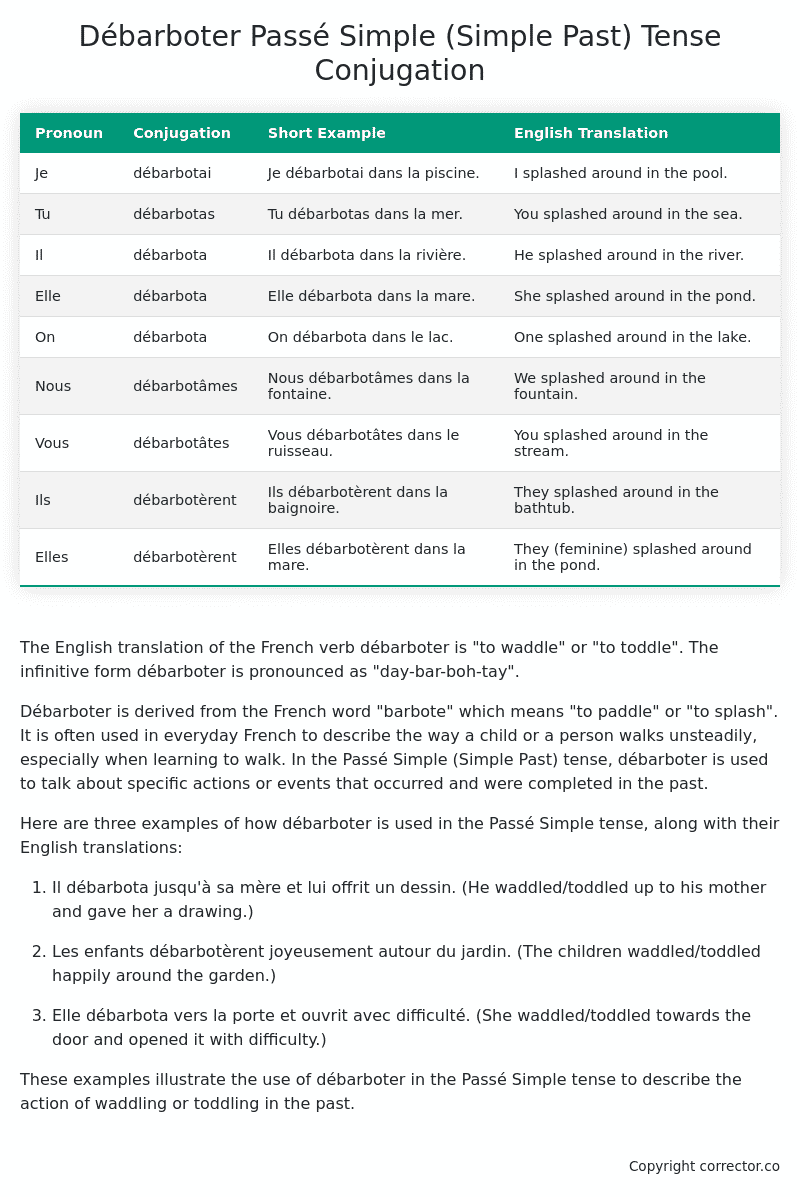Passé Simple (Simple Past) Tense Conjugation of the French Verb débarboter
Introduction to the verb débarboter
The English translation of the French verb débarboter is “to waddle” or “to toddle”. The infinitive form débarboter is pronounced as “day-bar-boh-tay”.
Débarboter is derived from the French word “barbote” which means “to paddle” or “to splash”. It is often used in everyday French to describe the way a child or a person walks unsteadily, especially when learning to walk. In the Passé Simple (Simple Past) tense, débarboter is used to talk about specific actions or events that occurred and were completed in the past.
Here are three examples of how débarboter is used in the Passé Simple tense, along with their English translations:
-
Il débarbota jusqu’à sa mère et lui offrit un dessin.
(He waddled/toddled up to his mother and gave her a drawing.) -
Les enfants débarbotèrent joyeusement autour du jardin.
(The children waddled/toddled happily around the garden.) -
Elle débarbota vers la porte et ouvrit avec difficulté.
(She waddled/toddled towards the door and opened it with difficulty.)
These examples illustrate the use of débarboter in the Passé Simple tense to describe the action of waddling or toddling in the past.
Table of the Passé Simple (Simple Past) Tense Conjugation of débarboter
| Pronoun | Conjugation | Short Example | English Translation |
|---|---|---|---|
| Je | débarbotai | Je débarbotai dans la piscine. | I splashed around in the pool. |
| Tu | débarbotas | Tu débarbotas dans la mer. | You splashed around in the sea. |
| Il | débarbota | Il débarbota dans la rivière. | He splashed around in the river. |
| Elle | débarbota | Elle débarbota dans la mare. | She splashed around in the pond. |
| On | débarbota | On débarbota dans le lac. | One splashed around in the lake. |
| Nous | débarbotâmes | Nous débarbotâmes dans la fontaine. | We splashed around in the fountain. |
| Vous | débarbotâtes | Vous débarbotâtes dans le ruisseau. | You splashed around in the stream. |
| Ils | débarbotèrent | Ils débarbotèrent dans la baignoire. | They splashed around in the bathtub. |
| Elles | débarbotèrent | Elles débarbotèrent dans la mare. | They (feminine) splashed around in the pond. |
Other Conjugations for Débarboter.
Le Present (Present Tense) Conjugation of the French Verb débarboter
Imparfait (Imperfect) Tense Conjugation of the French Verb débarboter
Passé Simple (Simple Past) Tense Conjugation of the French Verb débarboter (You’re reading it right now!)
Passé Composé (Present Perfect) Tense Conjugation of the French Verb débarboter
Futur Simple (Simple Future) Tense Conjugation of the French Verb débarboter
Futur Proche (Near Future) Tense Conjugation of the French Verb débarboter
Plus-que-parfait (Pluperfect) Tense Conjugation of the French Verb débarboter
Passé Antérieur (Past Anterior) Tense Conjugation of the French Verb débarboter
Futur Antérieur (Future Anterior) Tense Conjugation of the French Verb débarboter
Subjonctif Présent (Subjunctive Present) Tense Conjugation of the French Verb débarboter
Subjonctif Passé (Subjunctive Past) Tense Conjugation of the French Verb débarboter
Subjonctif Imparfait (Subjunctive Imperfect) Tense Conjugation of the French Verb débarboter
Subjonctif Plus-que-parfait (Subjunctive Pluperfect) Tense Conjugation of the French Verb débarboter
Conditionnel Présent (Conditional Present) Tense Conjugation of the French Verb débarboter
Conditionnel Passé (Conditional Past) Tense Conjugation of the French Verb débarboter
Conditionnel Passé II (Conditional Past II) Tense Conjugation of the French Verb débarboter
L’impératif Présent (Imperative Present) Tense Conjugation of the French Verb débarboter
L’impératif Passé (Imperative Past) Tense Conjugation of the French Verb débarboter
L’infinitif Présent (Infinitive Present) Tense Conjugation of the French Verb débarboter
L’infinitif Passé (Infinitive Past) Tense Conjugation of the French Verb débarboter
Le Participe Présent (Present Participle) Tense Conjugation of the French Verb débarboter
Le Participe Passé (Past Participle) Tense Conjugation of the French Verb débarboter
Struggling with French verbs or the language in general? Why not use our free French Grammar Checker – no registration required!
Get a FREE Download Study Sheet of this Conjugation 🔥
Simply right click the image below, click “save image” and get your free reference for the débarboter Passé Simple tense conjugation!

Débarboter – About the French Passé Simple (Simple Past) Tense
Formation
Usage
Narration
Historical Context
Interactions with other tenses
Passé Composé
Imparfait
Conditional and Subjunctive
Summary
I hope you enjoyed this article on the verb débarboter. Still in a learning mood? Check out another TOTALLY random French verb conjugation!


